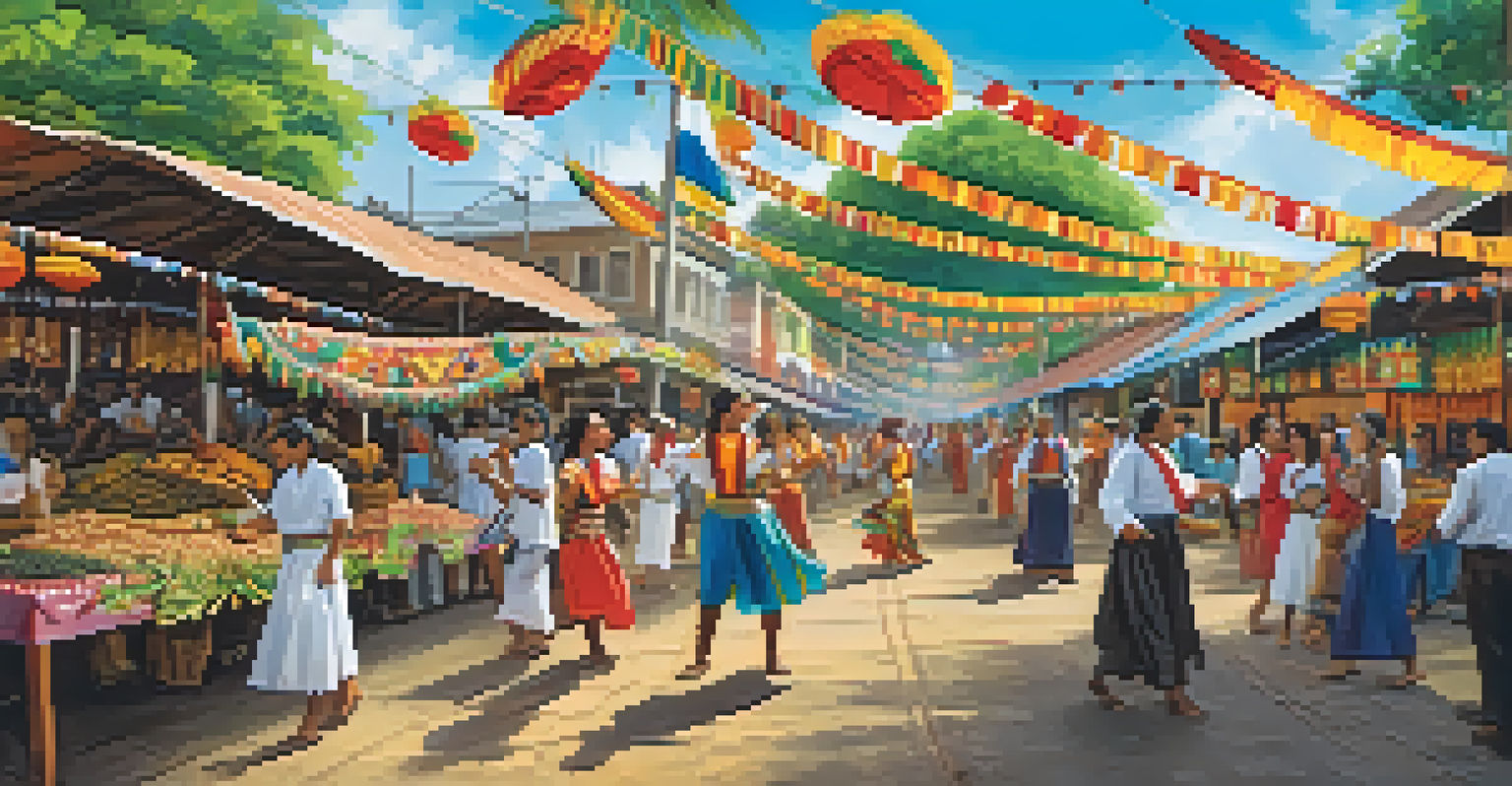Exploring the Historical Trails of Brazil: A Cultural Journey

Understanding the Significance of Historical Trails
Brazil's historical trails are pathways that tell the rich stories of its past. They connect significant cultural sites, where every step taken is a journey through time. Walking these trails allows us to experience the heritage and traditions that shaped the nation.
History is not a burden on the memory but an illumination of the soul.
These paths are not just routes; they are living museums filled with tales of exploration, colonization, and the convergence of cultures. From the indigenous peoples to the Portuguese colonizers, every group has left its mark along these trails. Understanding their significance helps us appreciate Brazil's diverse identity.
Moreover, these trails often lead to breathtaking landscapes, enhancing the journey with natural beauty. As we explore them, we not only learn about history but also connect with the land and its people. It's a cultural immersion that goes beyond textbooks.
The Gold Trail: A Journey Through Time
One of Brazil's most famous historical trails is the Gold Trail, or 'Caminho do Ouro.' This route was essential during the 18th century when gold was discovered in Minas Gerais. It served as the main route for transporting gold to the coast, shaping the economy and society of the region.

Walking the Gold Trail today, you can see remnants of colonial architecture, such as churches and old mining towns. These landmarks provide a glimpse into the lives of those who walked this path centuries ago. Each stop along the way reveals stories of fortune and hardship, making it a poignant experience.
History Lives on Brazil's Trails
Brazil's historical trails serve as living museums, connecting us to the country's rich cultural heritage and diverse identity.
The trail is not just about gold; it's also about the cultural exchange that took place. As traders and miners traveled, they brought diverse influences to the region, creating a vibrant mix of traditions and cuisines that still thrive today. The Gold Trail is a testament to Brazil's dynamic history.
The Royal Road: Connecting Hearts and Minds
Another significant trail is the Royal Road, or 'Caminho Real,' which connected the colonial capital of Rio de Janeiro to Minas Gerais. This route was vital for trade and communication in the 18th century, facilitating the movement of goods and ideas. Its importance cannot be overstated, as it played a crucial role in Brazil's development.
The past is never dead. It's not even past.
Traveling along the Royal Road, you'll encounter charming colonial towns like Paraty and Tiradentes. These towns are rich in history and architecture, inviting visitors to explore their cobblestone streets and cultural offerings. Each stop along the way is an opportunity to delve into Brazil's colonial past.
The Royal Road also served as a cultural melting pot, where different ethnicities and social classes mingled. This vibrant interaction laid the groundwork for Brazil's multicultural identity. By following this trail, you can appreciate the diverse influences that continue to shape Brazilian culture.
Exploring the Trail of the Jesuits
The Trail of the Jesuits, or 'Caminho dos Jesuítas,' takes you through the heart of Brazil's missionary history. Established by Jesuit priests in the 16th century, this trail was crucial in spreading Christianity among indigenous populations. It highlights the complex interactions between settlers and native peoples.
Along the Trail of the Jesuits, you can visit historic sites such as the ruins of Jesuit missions. These remnants reveal the architectural beauty and cultural significance of the Jesuit presence in Brazil. They also prompt reflection on the impact of colonization on indigenous cultures.
Cultural Festivals Enhance Experience
Participating in local festivals along these trails offers an immersive way to engage with Brazil's vibrant traditions and community spirit.
Walking this trail is more than just a historical excursion; it's an opportunity to understand the spiritual and cultural legacy left by the Jesuits. It encourages visitors to think critically about the past and its implications for present-day Brazil. This journey fosters a deeper connection with the land and its history.
The Coffee Route: A Taste of History
The Coffee Route, or 'Caminho do Café,' showcases Brazil's rich coffee heritage. In the 19th century, Brazil emerged as a global coffee powerhouse, and this trail takes you through the heart of coffee plantations. It's a flavorful journey that intertwines agriculture and history.
As you travel this route, you'll encounter sprawling coffee farms and charming colonial estates. Many of these establishments offer tours that reveal the coffee production process, from bean to cup. This is not just about enjoying coffee; it's about understanding its historical significance to Brazil's economy and culture.
The Coffee Route also highlights the social issues tied to the coffee industry, including the labor practices that shaped it. By learning about these aspects, you gain a holistic view of Brazil's coffee legacy. This journey invites you to sip, savor, and reflect on the complexities of this beloved beverage.
Cultural Festivals Along Historical Trails
Brazil is renowned for its vibrant cultural festivals, many of which take place along historical trails. These events celebrate local traditions and history, bringing communities together. Festivals like the Folia de Reis and Festa Junina showcase the rich tapestry of Brazilian culture.
Participating in these festivals along the trails enriches your travel experience. You get to witness traditional music, dance, and culinary delights that reflect the region's heritage. It's an immersive way to connect with the local culture and meet the people who keep these traditions alive.
Preservation Ensures Future Access
Efforts to preserve Brazil's historical trails are vital for maintaining the cultural narratives and experiences they offer for future generations.
These celebrations not only highlight Brazil's cultural diversity but also emphasize the importance of preserving history. They remind us that history is not just about the past; it's alive in the present through community engagement. Embracing these festivals allows you to appreciate Brazil's vibrant spirit.
The Role of Preservation in Sustaining Trails
As we explore these historical trails, it's essential to consider the role of preservation. Many of these sites face challenges due to urbanization and environmental changes. Efforts to maintain and protect these trails are crucial for future generations to experience their cultural significance.
Organizations and local communities are working tirelessly to preserve these historical paths. Initiatives include restoring landmarks, promoting sustainable tourism, and educating the public about the importance of these trails. Their dedication ensures that the stories embedded in these paths continue to be told.

Preservation is not just about maintaining physical sites; it's about safeguarding the narratives and traditions that shape Brazil's identity. By supporting preservation efforts, travelers can contribute to the ongoing journey of cultural discovery. Each visit helps keep the spirit of these trails alive.
Planning Your Journey Along Brazil's Historical Trails
If you're inspired to explore Brazil's historical trails, planning your journey is key. Start by researching the trails that interest you, such as the Gold Trail or the Coffee Route. Each trail offers unique experiences and insights, so choose one that resonates with your interests.
Consider the best times to visit, as many trails host festivals and events that enhance the experience. Additionally, think about your travel style—whether you prefer guided tours or independent exploration. Each approach offers a different perspective on Brazil's rich heritage.
Explore Brazil's Historical Trails
Brazil's historical trails offer an immersive journey through the country's rich cultural heritage and diverse identity.
Finally, immerse yourself in the local culture by trying traditional foods, engaging with communities, and learning from local historians. This journey is not just about the destination; it's about the connections you make along the way. Embrace the adventure, and let Brazil's historical trails unfold before you.